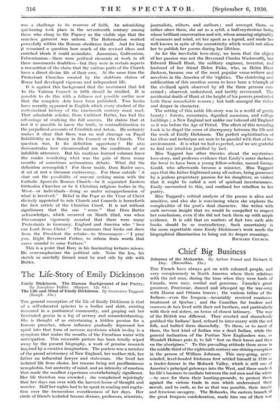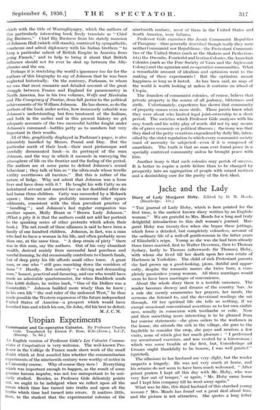Chief Big Business
Johnson of the Mohawks. By Arthur Pound and Richard R Day. (Macmillan. 218.) Tan French have always got on with coloured people, and very conspicuously in North America where their relations with the red man, during the time when they were lords of Canada, were easy, cordial and generous. Canada's great governor, Frontenac, danced and whooped up the war-song with Huron and Ottawa braves ; the various tribes of the Indians—even the Iroquois—invariably received courteous treatment at Quebec ; and the Canadian fur traders and courcurs de bois lived with their red brothers, and particularly with their red sisters, on terms of closest intimacy. The way of the British was different. They coveted and shamelessly grabbed the Indians' land, refused to inter-marry with the red folk, and bullied them shamefully. To them, or to most of them, the best kind of Indian was a dead Indian, while the general inclination of the Puritan New Englanders was, as Wendell Holmes puts it, to fall "first on their knees and then on the aborigines." To this prevailing attitude there arose in the middle third of the eighteenth century one shining exception in the person of William Johnson. This easy-going, acute- minded, level-headed Irishman first settled himself in 1738 as a trader-farmer in the Mohawk Valley, which is still one of America's principal gateways into the West, and there made it hislife's business to mediate between the red men and the white —to save for them their hunting-grounds, to protect them against the vicious trade in rum which undermined their morale, and to curb, so far as that was possible, their innate and ferocious savagery. The Mohawks, the eastern branch of the great Iroquois confederation, made him one of their war
chiefs with the title of Warraghiyagey, which the authors of this particularly interesting book freely translate as "Chief Big Business," Chief Big Business from his stately mansion of Johnson Hall (which still stands), contrived by sympathetic, courteous and adroit diplomacy with his Indian brothers "to, keep a particular salient of British Empire in America from going French," and to help to bring it about that British influence should not for ever be shut up between the Alle- ghenies and the sea.
Perhaps it is stretching the world's ignorance too far for the authors of this biography to say of Johnson that he was been neglected historically. On the contrary, Parkman, to whom we owe that most romantic and detailed account of the great struggle between France and England for paramountcy in North America, has in his two volumes, Wolfe and Montcalm and The Conspiracy of Pontiac, done full justice to the political achievements of Sir William Johnson. He has shown, as do the authors of the book under notice, how immensely valuable was Johnson's understanding but firm treatment of the Indians, and both in the earlier and in this present history we get adequate accounts of the two successful battles fought under. Johnson's command—battles petty as to numbers but very important in their results.
All of this, graphically displayed in Parkman's pages, is also admirably handled by Messrs. Pound and Day. But the particular merit of their book—their most picturesque and carefully documented book—is its portrayal of the man Johnson, and the way in which it succeeds in conveying the atmosphere of life on the frontier and the feeling of the period. The authors are at some pains to defend Johnson's sexual behaviour ; they talk of him as "the ultra-male whose terrific virility overthrows all barriers." But this is rather of the nature of fudge. Why not admit that Johnson was a loose liver and have done with it ? He bought his wife Catty as an indentured servant and married her on her deathbed after she had borne three children. Catty was succeeded by a Mohawk squaw ; there were also probably numerous other squaw oddments, consistent with the then prevalent practice of " bundling " ; and Johnson's last regular companion was another squaw, Molly Brant or "Brown Lady Johnson." (What a pity it is that the authors could not add her portrait to the speaking series of other protraits which adorn their book.) The net result of these alliancesjs said to have been a family of one hundred children. Johnson, in fact, was a man who had to have a woman in his life, and often probably more than one, at the same time. "A deep strain of piety" there was in this man, say the authors. Out of his very abundant wealth, derived mainly from successful land purchase and careful farming, he did occasionally contribute to Church funds, but of deep piety his life affords small other trace. A great man, or one who "still goes marching down the corridors of fame " ? Hardly. But certainly "a driving and demanding man," honest, practical and farseeing, and one who would have made an admirable quartermaster, for when Braddock sends him 4,000 dollars, he writes back, "One of the Dollars was a Counterfitt." Johnson builded more wisely than he knew ; in his own life "the real ruler of the unfenced West," he thus made possible the Western expansion of the future independent United States of America—a prospect which would have horrified him and which his son, Sir John, did his best to defeat.
M. J. C. M.































 Previous page
Previous page